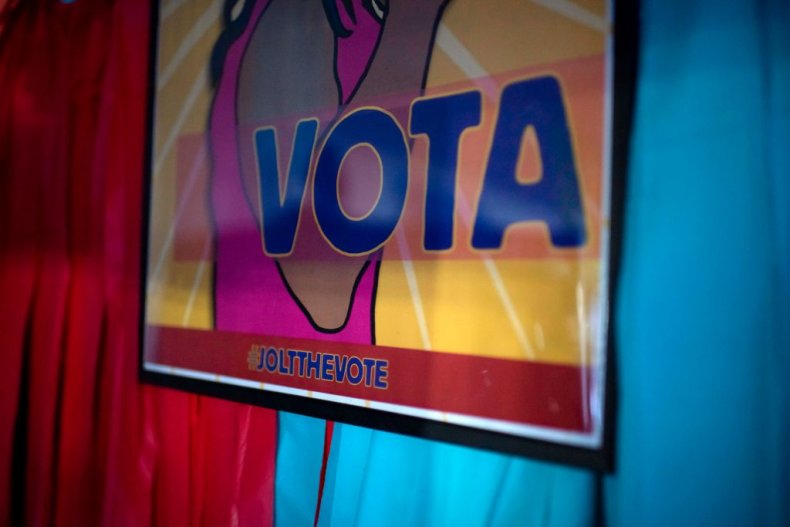In the Wake of Georgia Election Law, Democrats Say the Next Phase is Aimed at Latino Voters
In the aftermath of a Georgia election law that would make voting more difficult by limiting access to ballots, which became a flashpoint across the country, new efforts led by Republican-controlled legislatures have popped up in states across the country. Democrats say this latest front in their battle against voter suppression disproportionately affects Latino voters and must be stopped.
In states with some of the largest Latino electorates in the country, including Florida, Texas and Arizona, GOP-led bills seek to curtail voting.
In Florida, Republicans are considering banning ballot drop boxes and increasing limits to voting by mail. In Texas new proposals would severely restrict early voting hours and ways people could vote early. In Arizona, a formerly-red state like Georgia, which Democrats just barely flipped in November, new bills would purge infrequent voters from the early-voting list and also shorten the early voting period.
Representative Darren Soto told Newsweek the new efforts are part of a "concerted national effort by GOP legislatures to try to attack voting rights" because they lost the last election.
"We have a lot of new young voters because our population is a young one in Central Florida, and people have come to rely on voting by mail," Soto said. "Without a doubt, this would hurt Black and Brown turnout, especially in Latino communities in Central Florida."
The last thing Democrats need in Florida are further obstacles for Latinos, a population in which they lost large shares of the vote in November. Soto also pointed to mixed messaging from the Republican governor post-election.
"We saw Governor DeSantis on election night say the way Florida [administrated the election] inspires confidence," he said. "If it inspired confidence it means these new changes are straight-up voter suppression by all accounts in Florida."
SEIU International, one of the largest unions in the country and a reliable cog in the Democratic voter turnout machine, also tied renewed Republican interest in limiting voting to memories of the last election.
"Latino voters and workers across backgrounds turned out in huge numbers and voted for change in November, so it's no surprise that certain legislatures are trying to take their power away," Rocio Sáenz, SEIU's executive vice president, told Newsweek. "But we won't let them."
In Arizona, where Biden squeaked by Trump with an advantage of only 10,457 votes, he also received 63% of the Latino vote. When the election was certified, weeks after election day, Republican Governor Doug Ducey vouched for the process.
"We do elections well here in Arizona," Ducey said. "The system is strong."
But now, the tune in the state has changed. Democratic attorney Roy Herrera told Newsweek he's been an election lawyer in the state for a long time, "and I've never seen the volume of bad election proposals in the state and nationally."
He said making it more difficult to vote in Arizona means Latino voters will be affected, pointing out that early voting and drop boxes are popular among Hispanics, and citing the more onerous voter ID requirements Republicans are proposing.
"It's more difficult for Latinos to get a driver's license, it's less common," Herrera said.
Beyond language and immigration considerations, there is a financial aspect as well.
"It hurts working class people like a poll tax did," he said. "You have to get a government-issued ID, well, that costs money."
In Texas, the election was never in doubt for Trump, who won with a 5.6% margin. But Manny Garcia, who served as the executive director for the Texas Democratic Party during the 2020 cycle, noted it was the narrowest statewide gap for Republicans in 20 years. That's why, he said, Latinos would bear the brunt of the proposed changes.
"Some of the things in Senate Bill 7 and House Bill 6 are directly targeted at the actions of Harris County, which is one of the largest in the country and has a massive and growing Latino population," he said of the 44% Hispanic county, "from the number of hours to early vote, drive-thru voting to early vote, nighttime voting, 24/7 voting so shift workers could cast their ballot, and making it harder to vote by mail."
In Florida, Democrats said a sticking point for the Republicans pushing these laws is that they used to dominate vote by mail by an 8 to 1 margin, a dynamic that dropped in recent cycles and was remade by the pandemic landscape.
Voters have been accustomed to signing up to vote by mail, which was then valid for two consecutive voting cycles, with renewal an easy process. But the new legislation, which was approved by a state senate committee on Tuesday and could see a floor vote in the coming weeks, now requires voters to sign up for each cycle and eliminates drop boxes altogether, putting the onus on the voter in a way that hasn't been the case over the last decade.
"In immigrant and Latinx communities, in particular, there was not a lot of drama when it came to voting, but the proposed laws impact low-income people that don't have flexibility with their work schedule," said Dwight Bullard, the senior political advisor for Florida Rising, the largest Black and Brown social justice and civic engagement organization in the state.
Democrats and activists worry the new limitations on voting are about Republicans removing a variable they can't control from elections—in this case voters of color and Latinos.
"Donald Trump increased his win from 2016 to 2020, so you would think, Iif it ain't broke, dont fix it,' but if you're making it more difficult in 2021, then who exactly is it that you're trying to make it more difficult for?" Bullard asked, citing increased Black and Latino turnout in Florida in November.
"Too much turnout means you don't know where these folks are coming from or how they're going to vote from year to year," he said.


